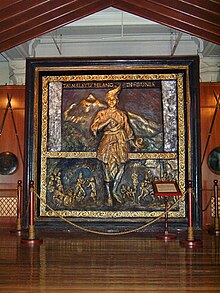Hang Tuah

Hang Tuah is a mythical hero from Malay history who is believed to have lived in the 15th century. He is the eponymous hero of the 15th to 16th century Malay epic Hikayat Hang Tuah (Eng. The story of Hang Tuah ) and is also mentioned in the 17th century story Sejarah Melayu (Eng. The Malay Chronicle ). Within these stories he is portrayed as a loyal subject to the Sultan of Malacca . In present-day Malaysia he is considered a national hero . However, its actual existence is not certain.
Depiction in the epic
The stories of the Hikayat Hang Tuah are embedded in a real historical background and take place during the reign of the fourth sultan of Malacca, Mansur Shah , who ruled from 1459 to 1477, and his sultanate at that time, the most powerful empire on the Malay Peninsula and the surrounding area Regions was.
Hang Tuah is described as the admiral of the Malacca fleet, who is revered as a glorious hero in the empire due to his success in the service of the Sultan and his unconditional loyalty to him. He owned a magical kris by the name of Taming Sari , which he captured in a duel with an opponent from the warring kingdom of Majapahit and which makes its owner invincible in battle.
Hang Tuah's fame, however, led to envious people among the ranks of the sultan's followers hatching an intrigue and accusing Hang Tuah of having amused himself with the sultan's concubines. He then took his kris from Hang Tuah and sentenced him to death without investigating the allegations more closely. Hang Jebat, one of the closest friends and blood brothers of the Hang Tuah, was appointed the successor and new owner of the Kris .
However, the Sultan's chief minister in charge of executing Hang Tuah did not carry out the sentence, but hid Hang Tuah. Hang Jebat, who knew nothing about this and wanted to avenge the death of his friend, turned his anger on the Sultan. As a result, a rebellion broke out in the empire and Hang Jebat drove the Sultan from his palace. He ordered the traitor to be killed, but no one except Hang Tuah, who was believed dead, would have been strong enough to defeat him in a duel. Recognizing the dilemma, the chief minister finally released Hang Tuah from hiding, who then went to the palace to carry out the sultan's order. Hang Jebat was relieved to see his friend alive, but this challenged him to a duel, where he regained the magical kris and killed Hang Jebat. Order was restored, the Sultan returned to his palace and Hang Tuah had again demonstrated his unconditional loyalty to his ruler.
Literary interpretation
Although Hang Tuah and Hang Jebat were close friends, and the latter only rebelled to avenge the death of the former, Hang Tuah's loyalty to the Sultan is ultimately unshakable. In the classical interpretation, this loyalty to the ruler was the highest virtue of every Malays, and the behavior of Hang Tuah as the highest model. The Sultan was the political and religious leader, and his rule as “God's shadow on earth” was divinely legitimized and incontestable. Any action directed against him was therefore regarded as high treason not only to the kingdom and ruler, but to God himself. Hang Tuah shows his loyalty to the Sultan and God by overcoming the ties to his friend Hang Jebat, who had betrayed these ideals. In this interpretation, Hang Tuah is still considered to be the Malaysian national hero . In addition to numerous roads across the country, a station of the Kuala Lumpur Monorail and a frigate of the Malaysian Navy are named after him.
Hang Tuah is also highly regarded in neighboring Indonesia . A corvette also bears his name in the Indonesian Navy .
Only in the modern poetry created after the Second World War is the story partly interpreted differently and processed in modern versions in theater plays. It is also interpreted as a criticism of those in power, represented here by the Sultan, who have no scruples about maintaining their power. Other depictions see Hang Jebat as the real hero of the story, who rebels against wrong conditions and injustice in his empire and ultimately dies for it, while Hang Tuah is viewed negatively and his unwilling loyalty to the Sultan is interpreted as cadaver obedience .
literature
- Nancy K. Nanny: Evolution of a Hero. The Hang Tuah / Hang Jebat Tale in Malay Drama . In: Asian Theater Journal , 5, 2, 1988, pp. 164-174.
- Hans Overbeck (translator): The story of Hang Tuah, a story from the 16th century about the Malay folk hero , Gustav Kiepenheuer Verlag, Leipzig and Weimar, 1986, 579 pages